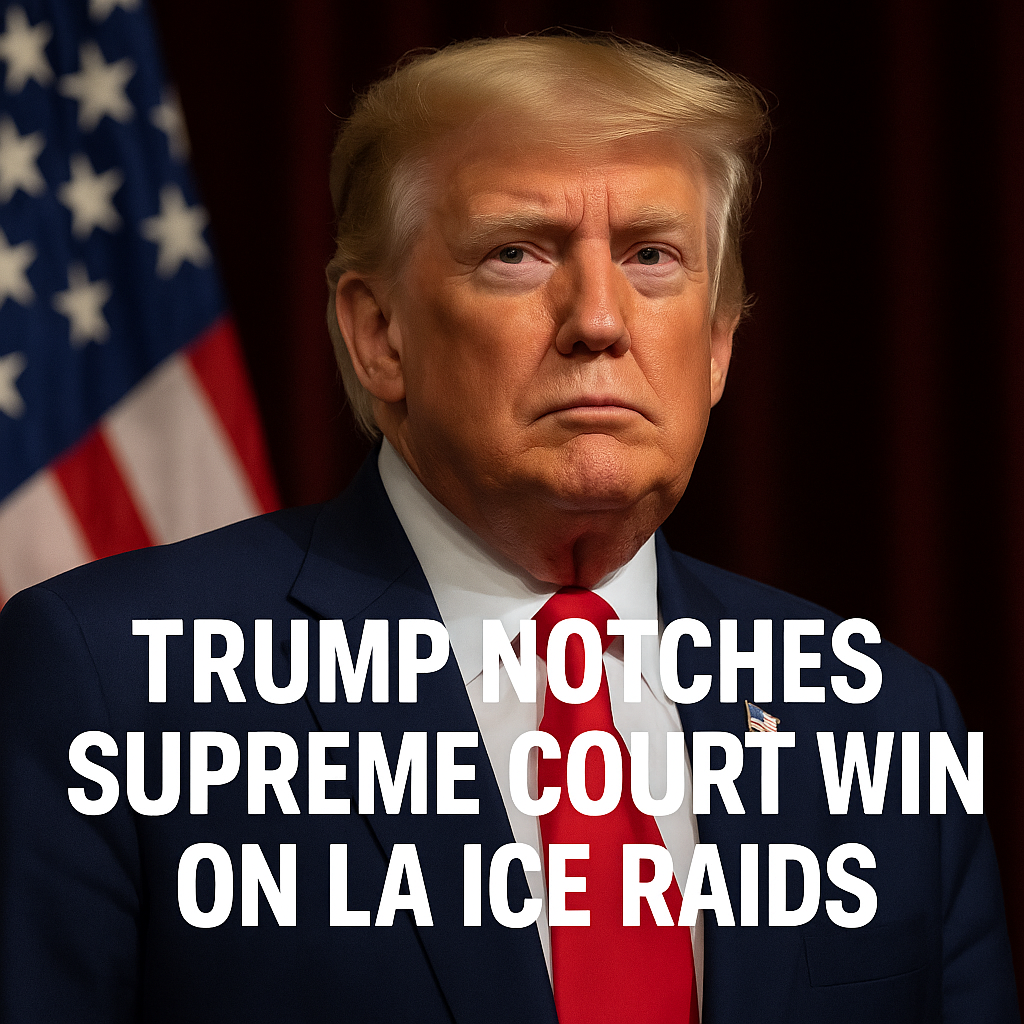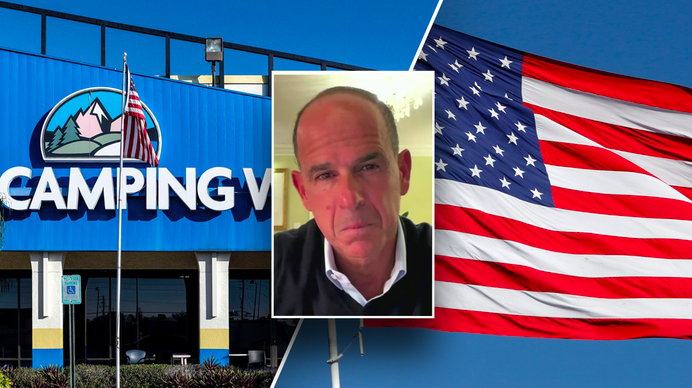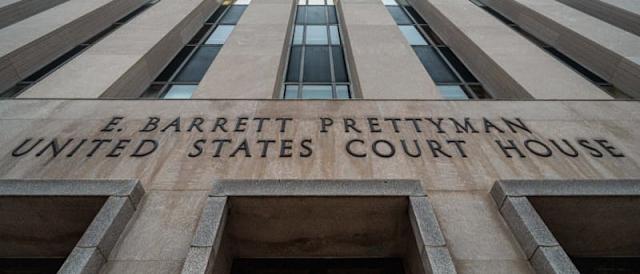President Donald Trump secured a major legal victory this week as the Supreme Court cleared the way for Immigration and Customs Enforcement (ICE) to resume sweeping raids in Los Angeles.
The ruling reverses lower court restrictions that had limited federal agents’ ability to detain and deport those in the country illegally. The decision marks a pivotal moment in Trump’s broader push to restore law and order to America’s immigration system, especially in so-called “sanctuary” jurisdictions like California.
The 6–3 decision from the high court lifted injunctions that had blocked large-scale operations in Los Angeles County, where progressive officials have resisted federal enforcement and adopted policies shielding illegal immigrants from deportation. By siding with Trump, the Court reaffirmed the federal government’s authority to enforce immigration laws across the nation — even in states that have attempted to obstruct such efforts.
- Background: In June 2025, the Trump administration began sweeping immigration enforcement operations in Los Angeles. A lawsuit was filed in July by civil rights groups and individuals, including some U.S. citizens, claiming that agents were conducting unconstitutional “roving patrols” and making stops based on racial profiling.
- Lower court ruling: U.S. District Judge Maame Ewusi-Mensah Frimpong issued a temporary restraining order restricting agents in the Central District of California. The order barred immigration officials from using factors like apparent race, speaking Spanish or accented English, or presence at certain job sites as the sole basis for “reasonable suspicion” to detain someone.
- Supreme Court’s decision: The court’s unsigned emergency order paused the district judge’s restrictions. In a concurring opinion, Justice Brett Kavanaugh stated that while ethnicity alone is not enough for reasonable suspicion, it can be a “relevant factor” when combined with other circumstances. The court provided no further explanation for its decision, which is common in emergency matters.
- Dissenting opinion: The three liberal justices—Sonia Sotomayor, Elena Kagan, and Ketanji Brown Jackson—dissented. In a fiery dissent, Justice Sotomayor stated that the decision makes all Latinos “fair game to be seized at any time” based on their appearance, job, or where they are.
- Enforcement resumes: With the order lifted, Immigration and Customs Enforcement (ICE) agents can resume the tactics that were halted by the lower court. The Department of Homeland Security celebrated the decision as a win for “the safety of Californians and the rule of law”.
- Ongoing legal challenge: The Supreme Court’s ruling is temporary while the larger legal challenge proceeds through the lower courts. The high court may ultimately hear the case if the Ninth Circuit Court of Appeals upholds a preliminary injunction.
- Potential for escalation: The ruling comes amidst escalating immigration enforcement efforts by the Trump administration, with reports indicating plans for additional large-scale operations in other cities.
Justice Brett Kavanaugh, writing for the majority, stressed that immigration enforcement is a federal prerogative and that state or local policies cannot override lawful federal directives. He emphasized that Congress has delegated to the executive branch the responsibility to secure the nation’s borders and remove those without legal right to remain. This, Kavanaugh noted, is not a matter of state discretion but of constitutional necessity.
For years, Los Angeles has been ground zero for the clash between federal immigration officers and local officials determined to shield large immigrant populations. Progressive leaders in California have passed “sanctuary” laws forbidding police from cooperating with ICE. As a result, dangerous criminal aliens were repeatedly released back into communities. The Court’s ruling, therefore, represents a critical correction, placing the safety of citizens above the political posturing of local governments.
Trump celebrated the ruling as vindication of his administration’s approach. “This is a victory for every American family that wants to live in a safe community,” he said in a statement. “The Supreme Court confirmed what we have been saying all along: the President has both the authority and the duty to enforce our immigration laws.” His allies, including South Dakota Governor Kristi Noem, praised the decision as a much-needed step toward restoring national security.
Opponents, including immigrant advocacy groups and California Democrats, condemned the ruling as cruel and disruptive. They warned of mass arrests and family separations. Yet their objections sidestep the fact that illegal entry into the United States violates federal law. A society built on the rule of law cannot long survive if certain groups are permitted to ignore it with impunity. Scripture reminds us that government authorities are “God’s servant for your good” (Romans 13:4), entrusted with punishing wrongdoing. Immigration enforcement, therefore, is not inherently immoral but a legitimate exercise of God-ordained civil authority.
The decision also underscores the ideological divide in America. On one side stand conservatives who argue that citizenship and sovereignty must mean something — that borders are essential to national identity. On the other are progressives who push for open borders under the guise of compassion, even as crime rises and social services strain under the weight of mass illegal migration. This ruling sends a clear signal: the Constitution does not permit states or cities to nullify federal law.
The ruling comes as Los Angeles faces a surge in homelessness, crime, and social instability — problems compounded by unchecked immigration. The city has long served as a magnet for those entering illegally, drawn by sanctuary protections and generous welfare programs. By allowing ICE to resume enforcement operations, the Court’s decision could help relieve some of the burden borne by law-abiding citizens.
Conservative Christian leaders have often reminded believers that compassion for the foreigner must be balanced with fidelity to justice. The Bible calls for love of neighbor, but it does not require nations to surrender their sovereignty or reward lawlessness. As Trump and his allies point out, true compassion also means protecting families from the dangers posed by gangs, drug traffickers, and repeat offenders who exploit weak enforcement.
The Supreme Court’s ruling thus represents not merely a political win for Trump but also a reaffirmation of the biblical principle that rulers “bear the sword” to punish wrongdoers. For Christians concerned about the erosion of law and morality in America, the decision offers hope that order can be restored even in states openly hostile to federal authority.
Critics argue that aggressive enforcement will spread fear in immigrant communities. But the responsibility for that fear lies not with the Court or with ICE, but with those who chose to violate the law. A society cannot function if lawbreaking is normalized. Trump’s insistence on securing the border and deporting those who disregard immigration laws is consistent with his campaign promise to put Americans first.
The Court’s ruling also strengthens Trump’s hand as he campaigns for a return to the White House. Immigration remains a top concern for voters frustrated with chaos at the southern border. By securing this victory, Trump can point to concrete progress in reasserting federal authority over lawless sanctuary policies. For many conservatives, it affirms that God’s design for nations — with boundaries and ordered governance — is still possible in an age of globalist pressure.
Keywords: Trump – Supreme Court – ICE raids – Los Angeles – immigration enforcement – sanctuary cities – California – border security – conservative values – Christian worldview






